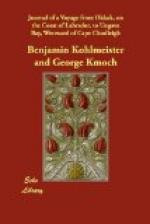At first, the people in the tents appeared rather shy, but after accepting of some trifling presents, they became quite communicative, and gave us some of their toys in exchange; then walking round us, surveyed us narrowly, as if we were a new species of animals. Most of them had never before seen an European. Uttakiyok’s brother had joined them, and already informed them of our arrival, without which they would probably have been yet more alarmed at seeing strangers, and hearing the report of fire-arms.
They now invited all our people to dine with them, and having heard that Brother Kohlmeister would like to taste the flesh of a whitefish, a kettle was immediately placed on the fire, and a large piece put in to boil. Brother Kmoch meanwhile cooked a savoury soup of birds, and reindeer-flesh, more fit for an European stomach. While dinner was preparing, Brother Kohlmeister took a walk up the bank of the river, and across some hills. As the families belonging to Eivektok had their summer dwelling in that neighbourhood, the Esquimaux, on perceiving that he had walked in that direction, and fearing that the Eivektok people, seeing him alone, might mistake him for an Indian, and shoot at him, dispatched two men to bring him back. They missed him, and he returned before them. He found our people very pleasantly conversing with the heathen concerning the aim of our journey, and the way of salvation. Even Uttakiyok was thus engaged, explaining, as well as he could, the cause of our living in Labrador: he exclaimed, “let us, my friends, all be converted to Jesus.” He was heard with peculiar attention, being considered as a captain among them. In the evening we sang hymns in Jonathan’s tent. The people all came and listened with much seriousness.
26th. To-day the Eivektok families came in a skin-boat down the river, to see us. They were full of astonishment, but soon took courage, and handled us, to discover whether we were made of the same materials with themselves. An old man, Netsiak, addressed Brother Kohlmeister: “Are you Benjamin? I have never seen you with my eyes, but at Eivektok have heard your name often mentioned.” He seemed to be a sensible man, and a captain among his tribe.
We could not help remarking the difference between these Esquimaux and their countrymen living on the same coasts with our settlements. The former are very poor, and miserably equipped, whereas the latter, by their intercourse with us and other Europeans, have acquired many conveniences, and are, by barter, well provided with what they want.




